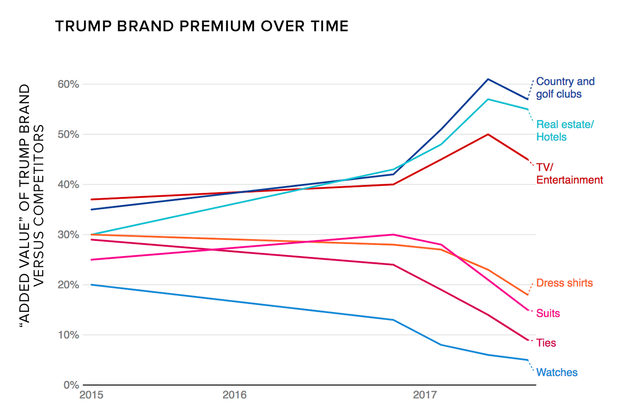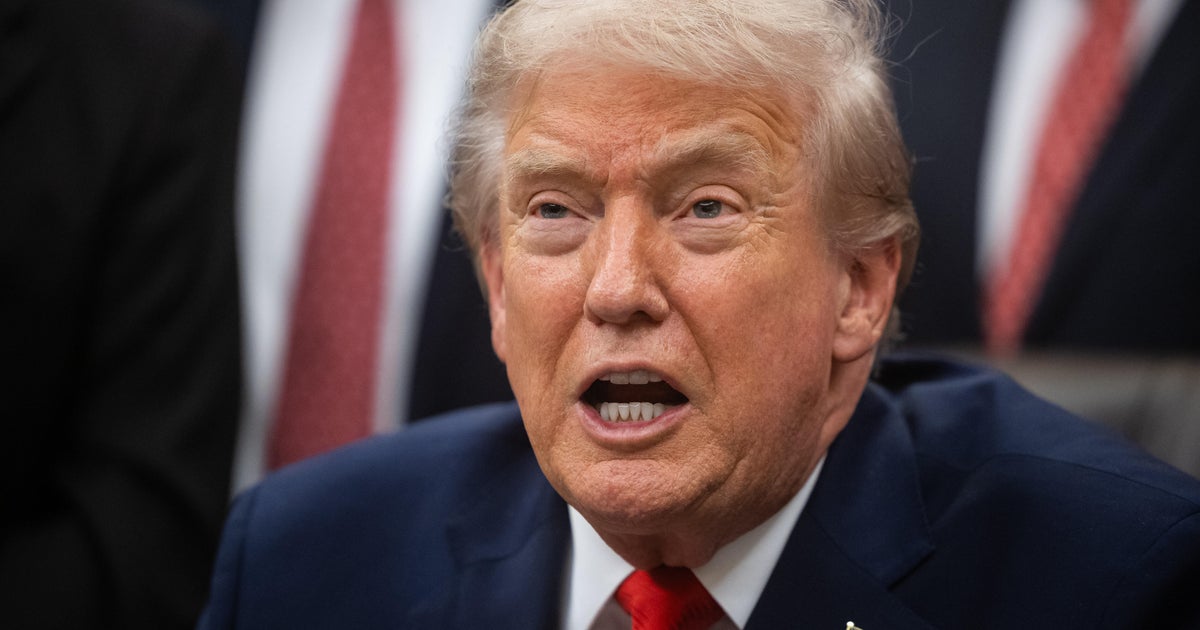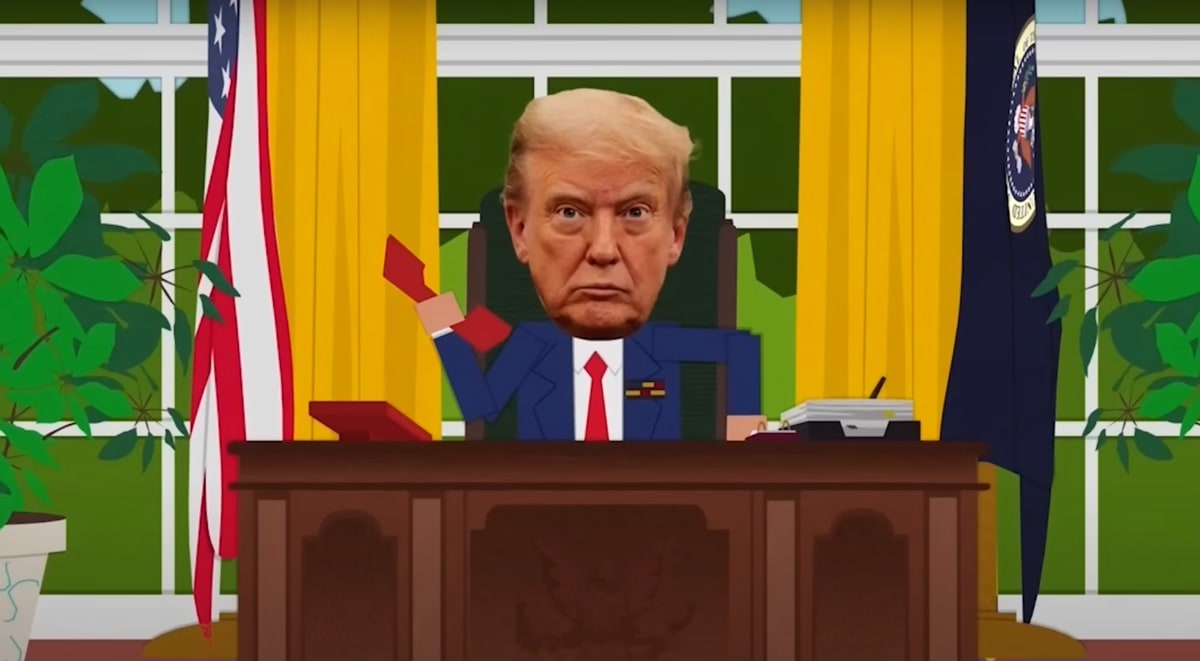The Trump brand's shrinking power
The family brand President Donald Trump so cherishes is showing signs of distress nine months into a presidency scarred by divisive rhetoric, multiple investigations, a White House staff in turmoil and a dearth of policy victories.
A survey shows consumers today are willing to pay much smaller premiums for Trump-branded dress shirts, ties, suits and watches compared to the period following Donald Trump's election victory in November 2016. Meantime, a parade of corporate and charitable organizations have canceled events at Trump-branded properties.
The Trump Organization has excluded its corporate name from two new hotel lines, opting instead for the names "Scion" and "American Idea," the latter for a patriotic-themed chain of budget hotels set for launch in Mississippi. And in Toronto, the owners of a former Trump International Hotel reportedly paid $6 million for the right to remove the Trump name and replace it with Marriott's St. Regis brand.
The most exclusive categories of the privately held Trump family business, including golf clubs and luxury hotels, have shown resilience in the minds of consumers, according to an August survey of more than 2,000 Republicans, Democrats and independents from across the country by the marketing consultancy Brand Keys. The survey suggests the Trump name still brings extraordinary "added value" in the real estate, golf club and entertainment categories, but it signals trouble afoot for a brand that once boasted more of a universal appeal.
The numbers reflect a stark divide between consumers of more expensive Trump categories -- an "illuminati club" of sorts eager for access to the president and willing to forgive a lack of decorum in exchange for potential tax cuts -- and a more mainstream consumer whose historical affinity for the brand is tied to Trump's image as a successful, smart businessman, said Robert Passikoff, the founder and president of New York City-based Brand Keys.
"I think the problem is he's beginning to not look like a very smart businessman," Passikoff said in an interview with CBS MoneyWatch. "There are also the issues of people offended by him, and they really don't want to be associated with someone who talks the way he talks."
The Trump Organization did not respond to a request from CBS MoneyWatch for information on its brand value. The privately held company rarely shares its metrics publicly, so it's difficult to determine whether brand erosion that shows up in consumer surveys also hits the company's bottom line.
Human brands as valuable as Trump's are both rare and vulnerable, since the "qualities and attributes" of the brand namesake "reflect totally" on the products or services offered, Passikoff noted.
Consider the case of Martha Stewart: Her empire was worth almost $2 billion when it went public in 1999, a few years before her infamous 2004 conviction for insider trading. The damage was lasting, and the company sold for just $350 million in 2015.
"The entire brand was embodied with her perception as a creative human being, and the minute she went to jail, it was like ripping off one leg of a table," Passikoff said. "It tipped over."
Another example is Tiger Woods, who saw $22 million in endorsement deals disappear after a sex scandal in 2009. "He's kind of old news as a brand," Passikoff said of Woods.
Trump is one of the "three saddest American brands right now," alongside Kmart (SHLD) and McDonald's (MCD), AdAge said in a late-September column by Simon Dumenco.
"Yes, I'm going there," Dumenco wrote. "I'm grouping the once high-flying Trump 'luxury' brand with McDonald's and Kmart. Which, of course, is rather unfair to McDonald's and Kmart (neither of which, we can presume, would ever side with white supremacists)."
Dumenco blamed Trump himself, a 71-year-old who "doesn't want to change" -- resulting in a brand that stands "for nothing so much as anxiety, uncertainty … and limbo."
Even during the election, traditional branding metrics suggested the Trump name would lack staying power, said Susan Hickey, senior vice president of marketing and communication for brand-strategy and market-research firm Kantar Millward Brown, which maintains a brand-equity database called BrandZ.
Using a framework that considers measures of "meaning, salience and difference," the firm compared Hillary Clinton to the likes of American Airlines (AAL), Visit Florida and the U.S. Postal Service. The brand equivalents for Bernie Sanders were JetBlue (JBLU) and Instagram (FB).
But Trump? His brand was plenty differentiated, and certainly relevant, but was badly lacking in the "meaning" category.
"His profile didn't match with any brands in our database of 100,000 brands," Hickey said. "Typically a brand like that ... can break through initially but over time isn't connecting, so its difference and salience are not going to keep it for the long term."
If the firm ran the study again today, Hickey figures Trump would register as just as salient but less differentiated -- his shock-jock routine has grown predictable and in some ways his presidency, at least in terms of the staff surrounding him, is more traditional than expected.
One thing's for certain: Trump's brand and presidency cannot be separated, and his style of politics is not one most mainstream consumer brands have embraced.
"Brands try to avoid [politics] at all costs, and for good reason," Hickey said. "You're going to step into something that could turn off a certain percent of your customers."
But while some customers -- including nonprofit and corporate groups that once held annual events at Trump golf and resort properties -- are fleeing any association with the Trump brand, politically affiliated groups are flocking to Trump properties in hopes of currying favor with the president.
The politicization of the Trump brand, which once stood universally for "success and luxury," presents a dilemma for a company whose name now means different things to different people, added John B. Dinsmore, a professor of marketing at the Raj Soin College of Business at Wright State University.
"For his base, it probably means something akin to power and irreverence," Dinsmore wrote in an email to CBS MoneyWatch. "For his detractors, it probably means something about racism and insensitivity."
That could lead to efforts to redefine the brand's target audience -- and limit its reliance on third parties to reach consumers.
The Ivanka Trump brand -- waylaid by boycotts targeting its products and retail chains including Nordstrom (JWN) and Neiman Marcus pulling back on what it sells -- has responded by offering handbags and other fashion items direct-to-consumer via its website and a new store of its own set to open this fall in Manhattan's Trump Tower.
Passikoff expects the higher-income segments of the Trump brand -- the hotels and golf courses -- will be the only categories with long-term stamina, thought he also expects "some comeback" in the entertainment category since it's pretty difficult to look away from Trump.
But will the brand, one of the strongest Brand Keys has ever measured, fade away entirely, even once Trump gives up the influence of the presidency? Unlikely, Passikoff said.
"He had always been able to manage the brand well, and I think it's less likely it's going to totally hit the skids once he doesn't hold the position he has today," he said. "I think there's going to be a certain equilibrium we're going to see when he's not in the White House anymore."




